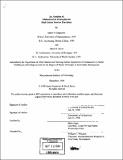An analysis of globalization strategies for real estate service providers
Author(s)
Gasperoni, James H. (James Henry), 1967-; Ravin, David R. 1971-
DownloadFull printable version (11.34Mb)
Advisor
Blake Eagle.
Terms of use
Metadata
Show full item recordAbstract
The technological advancements developed within the past decade have severely influenced the way national real estate companies do business. Geographical boundaries that once segregated companies into specific regions of dominance have all but disappeared. As other industries expand their operations overseas, real estate companies have had to devise their own international strategies in order to capitalize on the new 'global' market. This thesis will begin by stating three traditional hypotheses on how real estate companies should attempt to make the transition into becoming global real estate providers. These hypotheses include establishing a joint venture with an existing international corporation, acquiring a local presence by absorbing foreign real estate firms, and finally by marketing a firm's particular expertise to other foreign markets. The best solution depends on a particular company's strengths and weakness. Every international strategy requires a different strategic plan and implementation process. The second half of the thesis will involve three case studies on real estate providers that have already attempted the "globalization" transition. These companies include Lend Lease, CB Richard Ellis, and LaSalle Partners. The companies on the front line of any new industry venture are the first to test the academic hypotheses. We will compare and contrast the success of the aforementioned strategic plans with respect to these three companies. By carefully reviewing the successes and lessons learned by the industry leaders, other real estate companies can better understand their particular opportunities by going global. It is apparent to most of the real estate industry that the local specialized service provider is a dinosaur. Some companies have started the transition into tomorrow and it seems logical that other service providers will not want to reinvent the wheel.
Description
Thesis (S.M.)--Massachusetts Institute of Technology, Dept. of Urban Studies and Planning, 1998. Includes bibliographical references (leaves 136-139).
Date issued
1998Department
Massachusetts Institute of Technology. Department of Urban Studies and PlanningPublisher
Massachusetts Institute of Technology
Keywords
Urban Studies and Planning